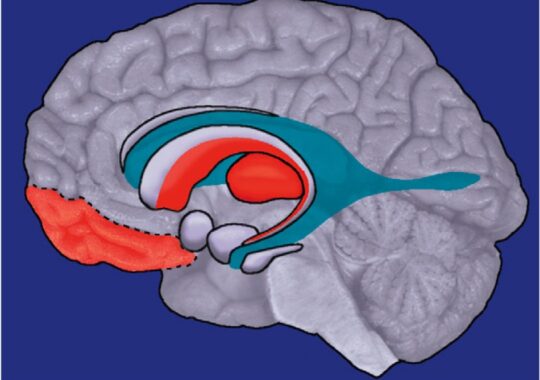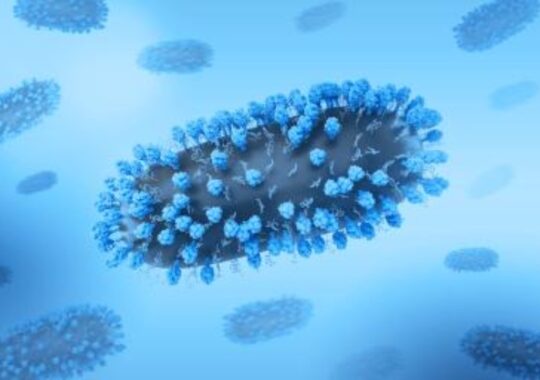If someone is overly tidy or organized, they often jokingly say they have “a bit of OCD” (obsessive-compulsive disorder). However, obsessive thoughts, impulses, or images that are recurrent and unwelcome are the hallmark of OCD, a severe and disabling disorder. Compulsions, which are ritualistic mental or physical actions, frequently accompany this.
Some people who suffer from obsessive compulsive disorder (OCD) cannot leave their homes and spend much of their waking time performing rituals. As the condition is hard to treat, existence with OCD can be incredibly troublesome.
Yet, in our new examination, distributed in Nature Correspondences, we found an awkwardness in cerebrum synthetics in OCD that could prompt profoundly unique and further developed medicines.
About 3% of the population suffers from OCD. The typical time of beginning is 19.5 years, and that implies that many cases go undetected in youth and pre-adulthood. NHS-suggested medicines incorporate mental conduct treatment and upper medications called specific serotonin re-take-up inhibitors (SSRIs), which help the compound serotonin in the mind.
However, SSRIs don’t work for half of OCD patients, so their symptoms are likely to persist to some degree. Furthermore, something like two months of supported treatment is normally required before any significant clinical improvement should be visible.
Understanding the brain’s chemical basis for OCD is essential for developing more effective treatments. Glutamate and gamma-aminobutyric acid (Gaba), which are chemical messengers or neurotransmitters, are thought to be out of balance in particular brain regions, according to scientists.
Gaba reduces or inhibits neural communication, calming the central nervous system and making us less inhibited, in contrast to glutamate, which promotes communication between neurons. As a result, imbalances in these chemicals can make it more or less difficult for neural circuits in the brain to communicate, which could result in symptoms like compulsions and thoughts that are too much to bear.
Attractive reverberation spectroscopy
To concentrate on glutamate and Gaba, we utilized a high-strength magnet (called 7-Tesla) to perform attractive reverberation spectroscopy. Radio frequency electromagnetic signals produced by atomic nuclei in molecules can be detected using this method. Scientists can use this to determine the type and concentration of chemicals that are present in the area.
We were able to distinguish between the levels of glutamate and gaba in various brain regions thanks to this. The supplementary motor area (SMA) and the anterior cingulate cortex (ACC), two brain regions located toward the front of the brain, were the focus of our particular investigation.
This is because previous research had demonstrated that OCD affects these areas that are involved in actions. The ACC’s activity shifts in response to reward or punishment, influencing subsequent decision-making. The SMA is engaged with the coordination of engine successions and appears to play a part in the development of propensities.
In a group of 31 people with OCD, we discovered an imbalance in glutamate and gaba levels in the frontal brain regions. In particular, OCD patients’ ACC levels of glutamate were higher and Gaba levels were lower. This implies that they had exceptionally elevated degrees of brain correspondence nearby, possibly making it hyperactive. They likewise had a disturbed harmony between these synthetics in the SMA.
Importantly, the glutamate levels we measured in the SMA were correlated with the clinical severity of OCD’s compulsive symptoms. There was also a correlation between glutamate in this region on self-rated compulsive tendencies questionnaires completed by OCD sufferers and healthy volunteer control group participants.
For the ACC, we tracked down that that individuals’ inclination to propensity (which is firmly connected to impulse) corresponded with the glutamate/Gaba balance that we found.
Improved OCD treatments that focus on restoring glutamate and gaba levels in key brain regions are encouraged by the findings. OCD sufferers may also have altered genes that control glutamate levels in the brain, according to some genetic evidence.
Drugs that stop nerve cells from releasing glutamate at certain receptors in the brain—known as metabotropic glutamate 2 receptors—are one option. As glutamate binds to these receptors, nerve cells that use it as a chemical transmitter are inhibited in their activity.
One such existing class of medications deals with this receptor and has previously been attempted securely in people. However, these medications have not yet been tested on OCD patients.
Surgeons have actually removed the ACC in extremely severe OCD patients for whom all standard treatments have failed. This is one of the few instances where psychosurgery has been shown to be beneficial, and there have been few reports of negative effects on cognition.
However, rather than removing the ACC from these patients in the future, deep brain stimulation with electrodes implanted could be used to reduce activity in this area.
Additionally, “transcranial magnetic stimulation” may have therapeutic potential for less severely impaired patients for whom such drastic treatments are not justified. This treatment is managed through an attractive curl situated against the scalp to correct the substance equilibrium and action of these brain circuits.
These new treatments offer patients with OCD hope for improved quality of life and well-being in the future if the disorder is diagnosed early on and the chemical imbalance we discovered is also detected.
Disclaimer: The views, suggestions, and opinions expressed here are the sole responsibility of the experts. No Clear Insight Research journalist was involved in the writing and production of this article.





